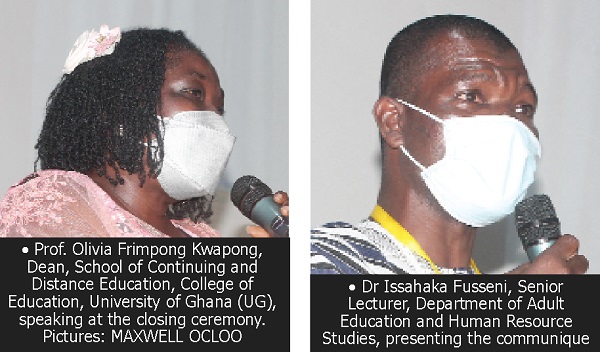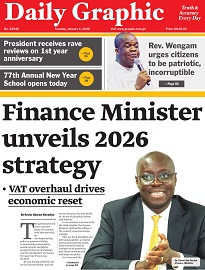
Introduce innovative ways to mobilise revenue - New Year School urges government
This year's New Year School and Conference has ended in Accra, with a call on the government to introduce innovative ways of mobilising domestic revenue, while cutting down on unnecessary expenditure and wastage in the public sector.
It has also been urged to improve on its data collection efforts to help with policy targeting in the future, which will save the country resources to be used for important sectors.
This was contained in a communiqué issued last Wednesday at the end of the two-day conference held at the University of Ghana, Legon.
New Year School
The New Year School and Conference is an annual event which provides the forum where issues of national interest and concern are discussed on a broader theme, with sub-themes.
Organised by the School of Continuing and Distance Education of the College of Education of the University of Ghana, this year’s event (the 73rd edition), held over two days, was on the theme: “COVID-19 and socioeconomic dynamics in Ghana”.
Among the participants were representatives from the trade unions, metropolitan, municipal and district chief executives, media practitioners, youth leaders, civil and public servants, traditional leaders, civil society organisations and faith-based organisations.
Health and technology
According to the communiqué, the Ministry of Environment, Science, Technology and Innovation, in collaboration with the Ministry of Health (MoH) and the Ghana Health Service, must identify emerging technologies, with emphasis on local content and innovation, and develop them to help address COVID-I9 challenges.
"The MoH should collaborate with relevant stakeholders in the health sector to provide continuous professional development in digital literacy and skills for healthcare workers to enable them to use these emerging technologies effectively," it said.
Digital infrastructure in education
On education, the communique indicated that digital infrastructure should be provided and made accessible to all to address inequalities in education.
It added that the Ministry of Education could leverage public-private partnerships to enhance the provision and affordability of Internet, data, computing devices and learning management systems.
"Policy initiatives at the state and institutional levels should address educational challenges in deprived communities," it said.
Agriculture
On agriculture, it noted that the government should review its benchmark value reduction policy to exempt products that could be manufactured locally to enhance the competitiveness of local manufacturers.
The government, it also said, should involve the private sector to provide warehouse infrastructure in rural areas to deal with post-harvest losses and improve the operations of the National Buffer Stock Company.
"The government, through the Ministry of Agriculture, should embark on an aggressive irrigation development programme to support its Planting for Food and Jobs initiative, with greater attention on the Savanna and temperate regions," it suggested.
The communique also advised that there should be a reversal of government's directive to the Ghana Revenue Authority to collect property rates at the local level.
"Property rates should be an integral part of the metropolitan, municipal and district assemblies revenue mobilisation efforts," it said, and called for the formula for the distribution of the District Assemblies Common Fund to be revised to provide adequate funding for poorly resourced districts.
It also said the land border closure was worsening security and had resulted in the use of unauthorised entry points by West African nationals and their Ghanaian accomplices.
Cost
"The cost of doing business has increased for those at the lower levels of the Ghanaian economic ladder," it said, suggesting that the government should replicate the extant COVID-19 protocols at the airports to the land borders to facilitate the livelihoods of the marginalised.
The government, it said, had devoted enormous resources towards economic, health and social alleviation for citizens; however, more was required in the area of mental health.
"Therefore, the conference recommends the design of psychosocial programmes on individual's resilience against the COVID-19 pandemic as part of peace promotion for vulnerable groups in society," it said.
The communique also advised that as a fiscal measure, the government should put in place a monetary policy regime that would encourage financial institutions to provide more credit facilities for the private sector at reduced interest rates.
New template
The Dean of the School of Continuing and Distance Education, College of Education, University of Ghana, Prof. Olivia Kwapong, in her closing remarks, explained that the template for the New Year School had changed for the better and so it had leveraged social media, the print and the electronic media to be able to broadcast its events.
That helped in the successful holding of a hybrid system of virtual and in-person attendance by participants, she said.

